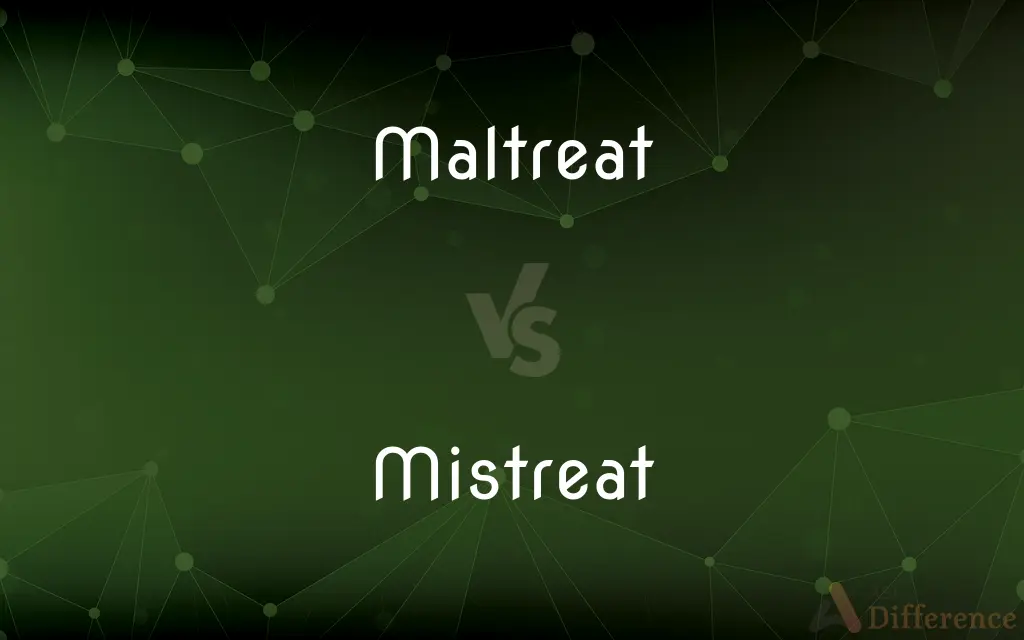Maltreat vs. Mistreat — What's the Difference?
Edited by Tayyaba Rehman — By Urooj Arif — Updated on April 16, 2024
Maltreat and mistreat both involve harmful treatment, but maltreat often implies physical harm or cruelty, whereas mistreat can include broader forms of abuse or neglect.

Difference Between Maltreat and Mistreat
Table of Contents
ADVERTISEMENT
Key Differences
Maltreat typically refers to harsh physical treatment or cruelty, often in situations where someone has power over another. Mistreat, while also involving harmful treatment, encompasses a wider range of abusive behaviors, including emotional or psychological harm.
Maltreat is often used in formal contexts, particularly in legal or policy discussions about severe abuse. Mistreat, on the other hand, is more commonly used in everyday language and can describe less severe forms of abuse.
Maltreat implies a deliberate intent to cause physical suffering or harm. Mistreat also implies harmful intentions but can include acts of neglect or failure to provide proper care.
Maltreat is most frequently associated with the treatment of prisoners, vulnerable adults, or children. Mistreat can be used more broadly, including how animals, employees, or even objects are treated.
The consequences of maltreating someone are typically severe and may involve legal ramifications. Whereas mistreating someone can also lead to legal consequences, the term does not inherently suggest the severity of the repercussions.
ADVERTISEMENT
Comparison Chart
Definition
Harsh physical abuse or cruelty
General harmful treatment or abuse
Severity
Often severe
Can range from mild to severe
Scope of Application
Primarily humans, especially in contexts of custody or care
Humans, animals, objects
Legal Connotations
Strong legal implications, often linked to severe penalties
Legal implications but broader in application
Common Usage
Less common, more formal
More common, casual usage
Compare with Definitions
Maltreat
To treat (someone) with cruelty or violence, especially regularly or repeatedly.
The dictator was known to maltreat his political prisoners.
Mistreat
To neglect the needs or well-being of others.
Employers who mistreat their workers may face strikes.
Maltreat
To abuse power in causing harm to others.
The official was removed for maltreating subordinates.
Mistreat
To use or handle something inappropriately.
Mistreating books by bending the spine breaks is frowned upon.
Maltreat
To handle or use something with violent disrespect.
Maltreating antique furniture can significantly diminish its value.
Mistreat
To treat someone or something badly, with cruelty or disrespect.
It's sad to see how some pets are mistreated.
Maltreat
To inflict physical harm in a way that violates rights.
Laws are in place to protect domestic animals from being maltreated.
Mistreat
To engage in improper care or handling.
Mistreating company equipment can lead to disciplinary actions.
Maltreat
To cause grievous physical harm under one's care.
The caregiver was accused of maltreating elderly residents.
Mistreat
To cause psychological or physical harm.
Bullying is a common way children might mistreat each other.
Maltreat
To treat in a rough or cruel way; abuse.
Mistreat
To treat roughly or wrongly.
Maltreat
To treat badly, to abuse.
Mistreat
(transitive) To treat someone, or something roughly or badly.
Maltreat
To treat ill; to abuse; to treat roughly.
Mistreat
To treat amiss; to abuse.
Maltreat
Treat badly;
This boss abuses his workers
She is always stepping on others to get ahead
Mistreat
Treat badly;
This boss abuses his workers
She is always stepping on others to get ahead
Common Curiosities
Can mistreating someone lead to legal consequences?
Yes, mistreating someone, especially if it involves abuse or neglect, can lead to legal consequences.
Is maltreat used differently than mistreat in legal contexts?
Yes, maltreat is often used in legal contexts to describe severe cases of physical abuse, while mistreat has a broader application.
What are some signs of maltreatment in children?
Signs of maltreatment in children include unexplained injuries, fearful behavior, and extreme withdrawal.
Can you mistreat an object?
Yes, mistreating an object refers to handling it badly or carelessly.
What does it mean to maltreat someone?
To maltreat someone means to treat them with severe cruelty or violence, often in a physical manner.
How can schools prevent students from mistreating each other?
Schools can implement anti-bullying programs and create a culture of respect and kindness to prevent mistreatment among students.
How does society view maltreatment versus mistreatment?
Society views maltreatment as a severe violation, often deserving strong legal penalties, whereas mistreatment can be seen as a broader spectrum of improper treatment.
Can neglect be considered a form of mistreatment?
Yes, neglect is a common form of mistreatment, especially regarding the care of children or animals.
Is it more serious to maltreat or mistreat an animal?
Maltreating an animal, which implies severe physical harm, is generally considered more serious than mistreating, which could also include neglect.
How do international laws address maltreatment?
International laws, such as those from the UN, strictly prohibit maltreatment, especially in contexts like war and imprisonment.
What legal protections exist against maltreating employees?
Various labor laws and regulations provide protections against maltreating employees, focusing on preventing physical abuse and ensuring safe working conditions.
What role does intent play in maltreating someone?
Intent is crucial in defining maltreatment, as it involves a deliberate desire to cause harm.
What are examples of mistreating someone emotionally?
Emotional mistreatment can include actions like verbal abuse, manipulation, or persistent criticism.
Can one incident of bad behavior be considered mistreatment?
Depending on the severity, a single incident can be considered mistreatment, particularly if it involves significant harm or neglect.
What are the psychological effects of being maltreated?
The psychological effects of being maltreated can include trauma, anxiety, depression, and long-term emotional distress.
Share Your Discovery

Previous Comparison
Dancing vs. Disco
Next Comparison
Breadth vs. BroadnessAuthor Spotlight
Written by
Urooj ArifUrooj is a skilled content writer at Ask Difference, known for her exceptional ability to simplify complex topics into engaging and informative content. With a passion for research and a flair for clear, concise writing, she consistently delivers articles that resonate with our diverse audience.
Edited by
Tayyaba RehmanTayyaba Rehman is a distinguished writer, currently serving as a primary contributor to askdifference.com. As a researcher in semantics and etymology, Tayyaba's passion for the complexity of languages and their distinctions has found a perfect home on the platform. Tayyaba delves into the intricacies of language, distinguishing between commonly confused words and phrases, thereby providing clarity for readers worldwide.














































